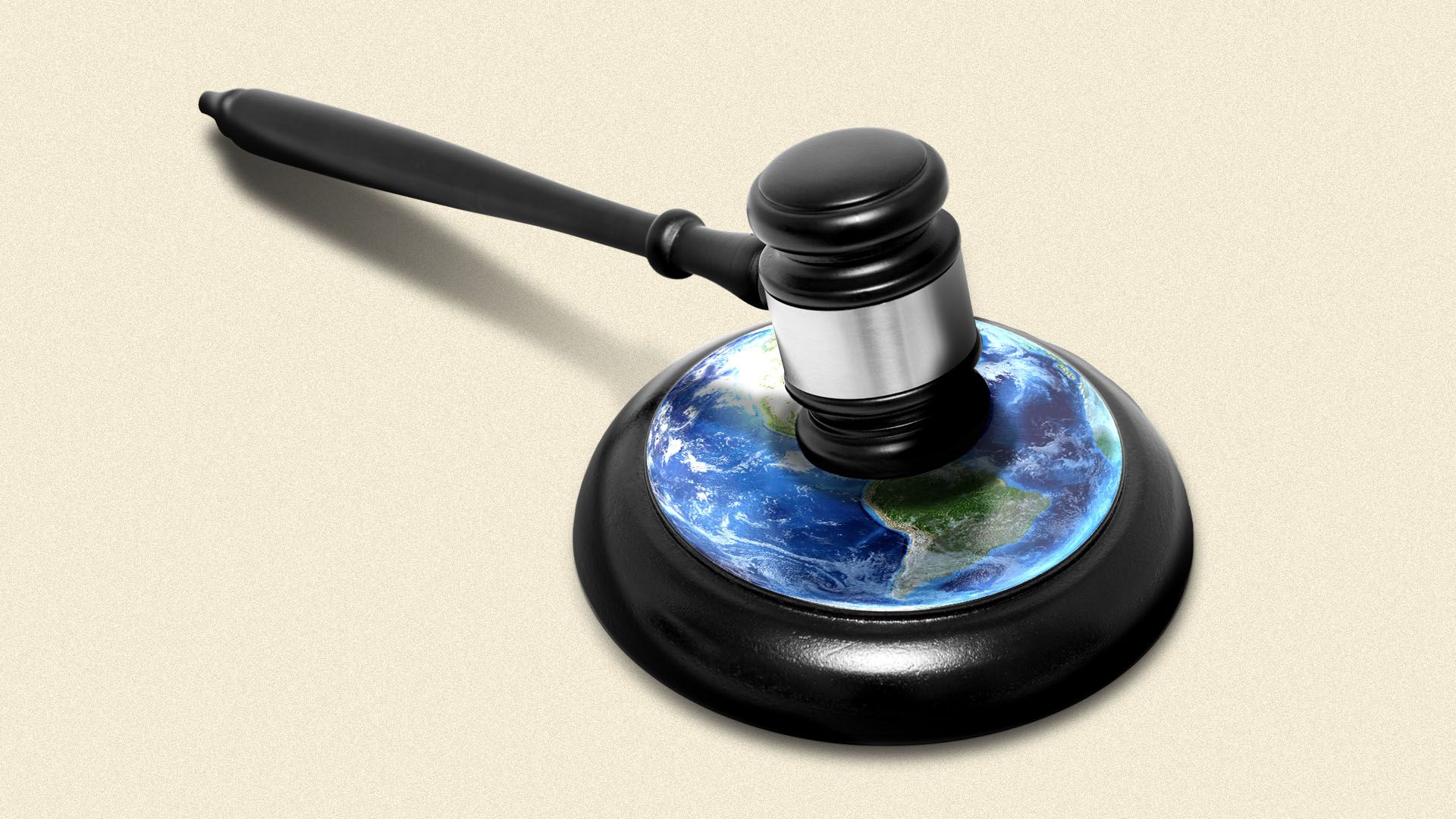Why the hottest global warming battle is in the courtroom
Add Axios as your preferred source to
see more of our stories on Google.

Illustration: Sarah Grillo/Axios
Forget the campaign trail and Congress. The real debate on climate change is happening in the courtrooms.
The big picture: With federal policy gridlocked, advocates are pushing an ever-growing list of long-shot lawsuits blaming big oil companies and the government for the planet’s hot mess.
Why it matters: Lawsuits are one key piece of the puzzle to getting big change on energy and climate policy. Even if advocates don’t win in court, they still draw media attention and put pressure on their targets.
- The more pressure grows, and if a ruling in advocates’ favor emerges as a possibility, the more likely corporations and/or the government would support policy addressing the matter.
Driving the news: Numerous cases are piling up that rest on various legal theories. Let's focus on three timely developments.
- A ruling is expected next month on a closely watched fraud lawsuit from the New York attorney general alleging ExxonMobil misled investors on its handling of climate-change costs. The Massachusetts AG just filed a similar lawsuit.
- Several lawsuits blaming a handful of big oil companies for rising temperatures are moving forward in courts across the country.
- After hearing oral arguments in June, a three-judge federal panel has yet to rule on a high-profile case where children are alleging the government failed them on climate change.
The Exxon case started out as a grand accusation, but it’s ending on a minor note.
- The AG’s office first began investigating Exxon in 2015, alleging the oil giant knowingly hid scientific knowledge about climate change from the public and its investors for decades and should be held liable for damages caused by rising temperatures.
- Four years later, the case is now a shell of its initial self: It’s about whether the oil giant confused investors with how it assesses the costs of climate-change policies on its operations.
- If Exxon loses, it could have to pay up to $1.6 billion in damages. This Bloomberg article goes deeper into the case.
- What’s next: The narrow lawsuit is already a win for Exxon, but if New York prevails in the ruling, expect advocates to spin this as a broader victory for climate action —even though it isn’t, largely because the law in question is unique to New York.
Another batch of lawsuits suing oil companies are relying mostly on state tort laws to allege a loss or harm, creating a legal liability.
- A growing list of cities and one state (Rhode Island) are suing Exxon, Shell and other oil companies, alleging they have created a public “nuisance” by producing and selling oil and natural gas knowing their products would fuel climate change.
- The cases seek compensation (amounts to be determined at trial) from oil companies to pay for costs governments are paying to respond to global warming, like the impacts of wildfires and rising sea levels.
- Some of these cases are now proceeding under state law, not federal law. Cases under federal law have been dismissed on the grounds that dealing with climate change is a matter for Congress and the president. The law is less tested at the state level.
- What’s next: Oral arguments at the U.S. Court of Appeals on whether federal or state law applies are scheduled for this month in a case brought by New York City. Other cases are proceeding at the state level.
Advocates and detractors alike are awaiting a ruling from a lawsuit filed by young people arguing the U.S. government has violated their constitutional rights by failing to act on climate change. The lawsuit calls on the government to reduce greenhouse gas emissions.
- A federal three-judge panel heard oral arguments in the case this summer, where the judges equally scrutinized both sides.
- Most legal experts say a win is unlikely given the novelty of the legal argument, but if it does occur, it would be a landmark victory for climate advocates. (It would also be appealed.)
- What’s next: A decision could come any time (tomorrow or not for months).
These three developments represent the latest round in what have been years' worth of climate litigation. Indeed, despite all this effort, climate advocates have not actually succeeded (yet) in legally pinning the blame on, well, anyone, including oil companies and the government.
“There are plenty of procedural pitfalls that these cases still have to navigate. That having been said, there are a diverse set of legal theories currently being tested in a variety of jurisdictions, so there is some reasonable chance that one or more will ultimately survive.”— Michael Livermore, University of Virginia law school professor not involved in the lawsuits.
What I'm watching: How these legal fights come up on the campaign trail. At least two Democratic presidential candidates, Elizabeth Warren and Bernie Sanders, have said they would pursue legal battles against big oil companies under similar arguments.
